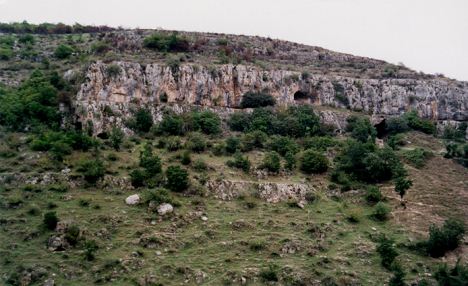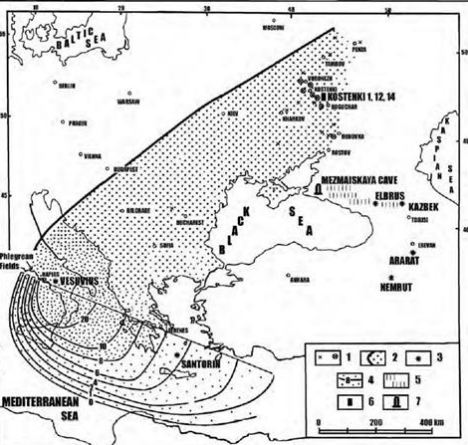
Neanderthal man may have been wiped out 40,000 years ago after a volcanic eruption
European Neanderthals may have been wiped out by a catastrophic volcanic eruption over 40,000 years ago, according to new research.
A new study says that a massive explosion caused the onset of a ‘volcanic winter’ that devastated their population.
Researchers led by Liubov Golovanova of Russia’s ANO Laboratory of Prehistory in St. Petersburg report that volcanic dust deposits found in a cave in the Caucasus show that an ecological disaster was responsible.
Very few plants existed in the volcanic dust layers, the researchers discovered.
The loss of plants would have affected the population of large mammals, which were the Neanderthals’ main source of food.
The Neanderthals were replaced about 30,000 years ago by modern-day humans.
Modern humans may have survived the fall-out because much of their population was in Africa which was unaffected, scientists believe.
The study’s authors write: ‘Volcanic eruptions had an unusually sudden and devastating effect on the ecology and forced the fast and extreme climate deterioration (‘volcanic winter’) of the Northern Hemisphere.’
The team analysed the soil layers in Russia’s Mezmaiskaya Cave and identified two types of volcanic ash corresponding to two separate volcanic eruptions in western Asia between 45,000 and 40,000 years ago.
One was a smaller eruption earlier in the Caucasus followed by a massive eruption around 40,000 years in what is now southern Italy.
Plant pollen recovered in the cave indicates that it was extremely cold and dry at around the same time these ash layers formed.

Russia’s Mezmaiskaya Cave where scientists’s analysed layers of volcanic dust

A graphic which shows how the ash from the volcano spread over a wide area causing a ‘volcanic winter’
The team write: ‘On the basis of these data, we offer the hypothesis that the Neanderthal demise occurred abruptly (on a geological timescale) at around 40,000 BP (before present) after the most powerful volcanic activity in western Eurasia during the period of Neanderthal evolutionary history.
‘We further hypothesise that this catastrophe not only drastically destroyed the ecological niches of Neanderthal populations but also caused their mass physical depopulation in most of their habitation areas across Europe and the Near East.
‘This loss of viable source populations may have significantly contributed to the eventual extinction of Neanderthals throughout their range.’
Neanderthals in the cave and elsewhere in Europe were ate lots of large game, such as bison and reindeer which made them vulnerable if the population of these animals fell dramatically.
Other experts have agreed with the study’s hypothesis.
Professor Pettitt from the University of Sheffield said there were no records for Neanderthals existing after around 38,000 years ago.
He said: ‘It therefore seems plausible that in most regions Neanderthal extinction-or at least significant depopulation-preceded the arrival of Homo sapiens.
‘The second volcanic eruption recorded in the cave’s sediments seems to have been critical to Neanderthal extinction – or at least disappearance – in the region.’
But other experts say that the Neanderthals were already in trouble long before the volcanic eruptions as humans began to crowd them out and occupying areas which had previously been the Neanderthals’ domain.
By Niall Firth
Last updated at 9:41 AM on 28th September 2010
Source: Daily Mail